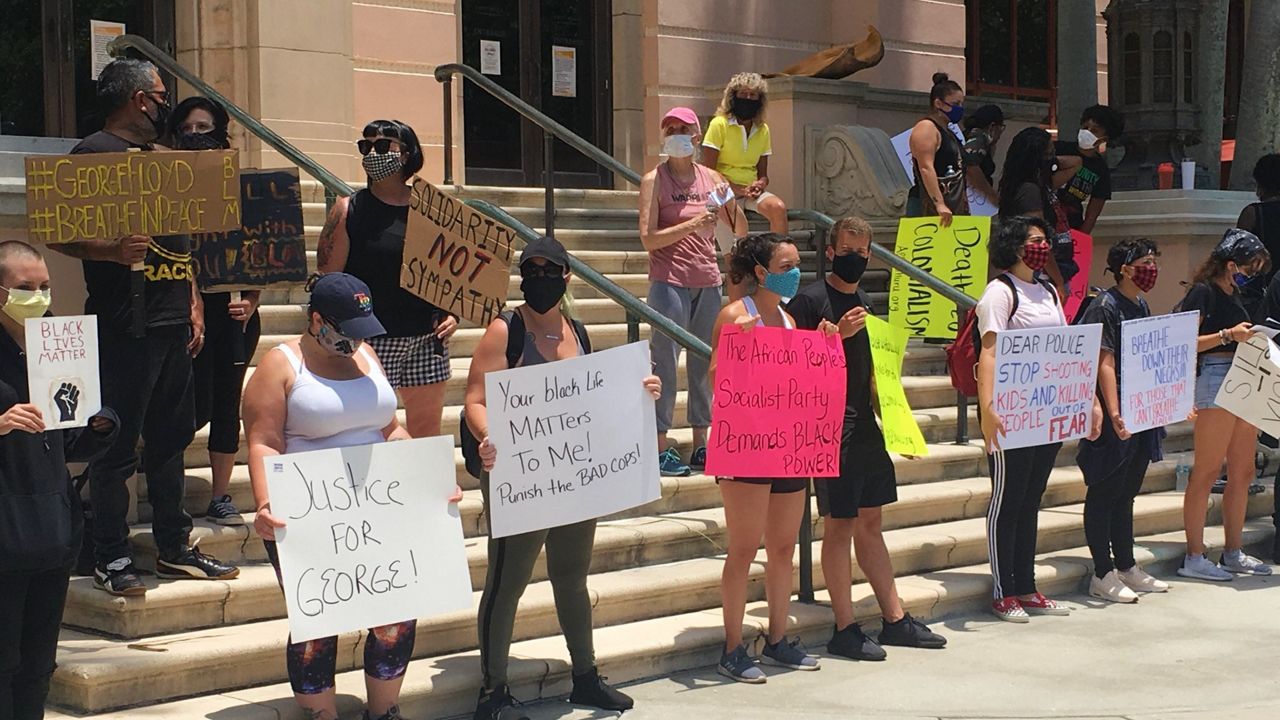HILLSBOROUGH COUNTY, Fla. — While there was a lot of rhetorical harmony between Republican and Democratic members of the Hillsborough County legislative delegation at a pre-session discussion on Friday, that bonhomie shattered when discussing a bill pushed by Governor Ron DeSantis that has been depicted as cracking down on violent protests.
“So House Bill 1 is one that I am very, very concerned about, because it does not protect our First Amendment right to peaceful protest. It attacks it,” said Hillsborough County Democratic state Rep. Fentrice Driskell at a Tampa Tiger Bay virtual forum on Friday.
The proposal to crack down on protesters was first announced by DeSantis at a press conference in Polk County last September, following months of protests throughout the state (and the nation) against racism and for police accountability spurred by the death of George Floyd. However, the House and Senate bills were not unveiled until January 6, the same day that the riot on the Capitol took place in the nation’s capital.
Among the provisions of the bill include:
- Upgrade penalties for illegal actions during riots;
- Making it a felony to destroy any memorial in the state;
- Limit a city’s ability to redirect funds from police to social programs.
Driskell cited a report published last September that said that 93 percent of the protests that broke out across the country beginning in late May of 2020 were peaceful and nondestructive.
She added that the proposal that would crackdown on violent protests is superfluous, because there are already “laws on the books” that could address Floridians who engage in criminal behavior such as destroying property.
That notion that there were no violent protests in Florida last summer was dismissed by Zephyrhills Republican state Senator Danny Burgess, who is sponsoring the Senate companion to HB 1. He mentioned the destruction of the Champs Sports store at the University Mall in North Tampa on May 30, the first night of protests following Floyd’s death. Burgess also mentioned a high-profile incident between Black Lives Matter activists and diners on Beach Drive in downtown St. Petersburg that went national in September.
“Watch the Twitter videos,” Burgess said. “Watch the video of a skateboard being thrown at somebody’s car who was trying to get through the intersection. Nobody ever sees the vantage point from the person in the car, do they? They don’t. What if there were kids in that car? What if my kids were in that car and I was driving that car? What would you do? Imagine the fear. Imagine how terrifying that would be.”
Another clear distinction in philosophy between members of the two parties was on the issue of preemption, which has been a thorn in the side of local lawmakers against Tallahassee going on a decade now.
The issue was brought up by Tiger Bay member Joe Citro, a member of the Tampa City Council who earlier this month dropped his resolution to get the city to go a 100 percent clean energy portfolio by 2030. Citro did so in part because of the strong possibility that GOP lawmakers are poised to pass legislation in the upcoming session that would forbid municipalities from approving any such proposals.
Tampa and St. Petersburg city leaders have also been stymied by the Legislature when it comes to crafting their own ordinances on trees, guns and plastic bags in recent years.
“It’s sad that each time a city has a goal to improve lives or improve outcomes in their municipality for their constituency, the interest groups turn to the state to preempt them,” said Tampa Democratic state Sen. Janet Cruz. She went on to criticize a legislative proposal filed by Pinellas County Republican Nick DiCeglie that would stop local governments from enacting apprenticeship programs, and said she would be filing her own bill that would model an apprenticeship proposal passed on Thursday by the Tampa City Council.
Both Burgess and Dover GOP Rep. Lawrence McClure said that while they were strong supporters of home rule, they defended the Legislature’s approach on those issues.
“We do have a role in Tallahassee and when we see local governments abusing certain policies or ordinances, that’s the conversation that we have up there,” said McClure.
There was plenty of agreement between the four lawmakers on other issues like preserving the Sadowski Housing Trust Funds, getting lead out of the drinking water in public schools, and that the perceived budget deficit from COVID-19 actually may not be as big of an issue in the upcoming session as originally feared. The evidence of that is the fact that DeSantis has proposed a budget for the next fiscal year that is actually more than $4 billion larger than last year’s.
“There are federal funds that have been passed down to the state in the form of COVID-19 relief that may offset some of the shortfalls that we are anticipating,” said Driskell.
McClure, the vice chair of the House Appropriations Committee, agreed with Driskell that help from the federal government will aid Florida, but cautioned that it’s not clear how much the state will ultimately receive.
“We’re a long ways away from the finalized budget, but hey look, if federal funds come down between now and then, that changes the whole dynamic,” he said.




